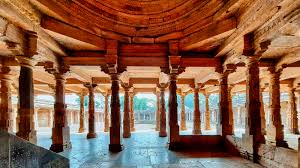Here are ten historical facts about Bhojshala
- Origins: Bhojshala, located in Dhar, Madhya Pradesh, derives its name from King Bhoja of the Paramāra dynasty, who ruled from approximately 1000 to 1055 AD and was a notable patron of education and the arts.
- Establishment: The site was originally established as a temple dedicated to Goddess Saraswati, also known as Vagdevi, in the year 1034 AD by King Bhoja, reflecting his commitment to learning and scholarship.
- Educational Hub: Bhojshala served as an important educational institution, often referred to as “Bhoja’s Pathashala,” where students studied various subjects, including grammar, philosophy, and the arts, under the guidance of learned instructors.
- Literary Contributions: King Bhoja himself authored several significant Sanskrit texts, including works on poetics and grammar, which were taught at Bhojshala, contributing to its reputation as a center of learning.
- Historical References: The Prabhavakacarita, a text written in 1277, provides evidence of Bhojshala’s existence and its role as an educational institution, mentioning students studying there during the reign of Chalukya king Siddharaja Jayasimha.
- Architectural Features: The architectural remnants of Bhojshala exhibit a blend of styles from different periods, primarily dating back to the 12th century, showcasing intricate carvings and inscriptions in Sanskrit and Prakrit.
- Conversion to Mosque: In the 14th century, the original temple was converted into a mosque by Muslim rulers, marking a significant shift in the site’s religious significance.
- Archaeological Discoveries: Colonial-era scholars, such as John Malcolm and K. K. Lele, conducted explorations that uncovered numerous inscriptions and architectural features, affirming the historical importance of Bhojshala.
- Cultural Significance: Bhojshala has been recognized as a symbol of cultural heritage, reflecting the historical interplay of Hindu and Muslim influences in the region.
- Monument Status: Today, Bhojshala is protected as a monument of national importance by the Archaeological Survey of India, highlighting its enduring legacy in Indian history.

